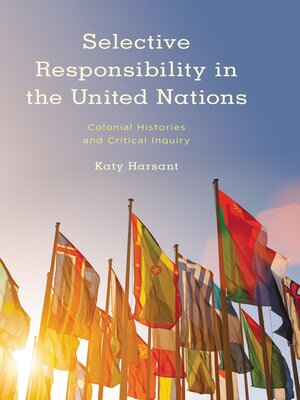Selective Responsibility in the United Nations
ebook ∣ Colonial Histories and Critical Inquiry · Kilombo: International Relations and Colonial Questions
By Katy Harsant

Sign up to save your library
With an OverDrive account, you can save your favorite libraries for at-a-glance information about availability. Find out more about OverDrive accounts.
Find this title in Libby, the library reading app by OverDrive.



Search for a digital library with this title
Title found at these libraries:
| Library Name | Distance |
|---|---|
| Loading... |
The United Nations claims to exist in order to maintain international peace and security, providing a space within which all states can work together. But why, then, does the UN invoke its responsibility to protect through humanitarian intervention in some instances but not others? Why is it that five states have the power to decide whether or not to intervene? This book challenges the dominant narrative of the UN as an institution of equality and progress by analyzing the colonial origins of the organization and revealing the unequal power relations it has perpetuated.
Harsant argues that the United Nations is unable to fulfill its claims around the protection of international peace and security due to its very structure and the privilege of certain states. Moreover, through a rigorous examination of the history of the UN and how those structures came to be, she argues that the privilege afforded to these states is the result of power relations established through the colonial encounter.
In order to understand the pressing contemporary issues of how the United Nations operates, particularly the Security Council, this book discusses issues of power and sovereignty by de-silencing the narratives of resistance and reconstructing a history of the United Nations that takes this colonial and anti-colonial relationship into account. This is a bold challenge to the eurocentrism that dominates International Relations discourse and a call to better understand the colonialism's role in preserving the existing global order.
Harsant argues that the United Nations is unable to fulfill its claims around the protection of international peace and security due to its very structure and the privilege of certain states. Moreover, through a rigorous examination of the history of the UN and how those structures came to be, she argues that the privilege afforded to these states is the result of power relations established through the colonial encounter.
In order to understand the pressing contemporary issues of how the United Nations operates, particularly the Security Council, this book discusses issues of power and sovereignty by de-silencing the narratives of resistance and reconstructing a history of the United Nations that takes this colonial and anti-colonial relationship into account. This is a bold challenge to the eurocentrism that dominates International Relations discourse and a call to better understand the colonialism's role in preserving the existing global order.







